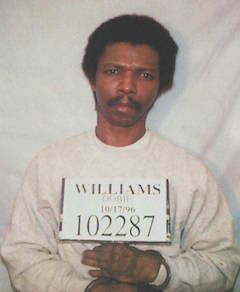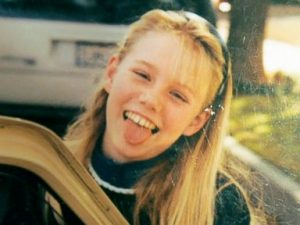Throughout the history of the United States, there have been tens of thousands of murders, rapes, and other heinous crimes. For over two-hundred years, the United States government intended to establish a fair and judicial system of justice. However, as countless cases of accused criminals have shown, our judicial system is not all that equal. As cases from the past prove, there have been instances where errors in the judicial system occur, resulting in unfair trials. Even worse, some of those inmates who have had unfair trials were convicted and in some cases, even sentenced to death row. So, is our judicial system all that just for all? In many cases it is just; however, in too many cases throughout our history, the system has been unfair to a number of accused individuals. An example of this is the trial of Dobie Williams, a young black man accused of the murder of a middle-aged white woman, Sonja Knippers on July 8, 1984. Dobie Williams had an unfair trial due to his race, few accommodations for his mental health, and an inept court-appointed attorney that he was provided.

Geography and race had a role to play in the unfair trial of Dobie Williams. Knippers was a white woman in her early forties, who was brutally killed in the bathroom of her southern home, located in Many, a small town in Lousiana, which was not a good place for Dobie, an African American, to be accused of murdering a white woman. Sister Hellen Prejean, a writer and a spirtual adviser for death row inmates, who accompanied Dobie throughout his trials and execution dates, explains that Dobie never had a fair trial due to being assigned an all-white jury during his hearing for the murder of Knippers; in addition, all of the judges, district attorneys, and the local media during the time were all white, further explaining possible prejudices that could stacked the odds against him. Many is a small town located in north central Louisiana, and it was not a city. It was a small, quiet, and mostly white town, where murder, or basically any other crime, was erratically unusual, especially in 1984, meaning that when crimes did happen, it was a huge deal. Consequentially, being a black individual accused of murdering a middle-aged white woman in a small town in the south was a bad situation to be in. We will never know for sure whether an all-white jury had anything to do with the conviction of Dobie Williams. But it still was not looking good for him, due to where the murder had taken place and the significance of the crime. In her book, Prejean, realizing the social injustices in Louisiana during the 1980’s, exclaimed that Dobie was, “in big trouble.”1 Prejean understood how geography had a role to play in the conviction of Dobie. Innocent or guilty, being a black minority during the time of Dobie’s trial in a small town located in the heart of the south was no easy thing to endure.

There are similar cases to Dobie’s in which a fair trial was not given because of such geography. In 1982 in Greenwood South Carolina, race played a significant role in the conviction of twenty-three-year-old Edward Lee Elmore, who was accused of the rape and murder of seventy-five-year-old Dorothy Edwards. According to Bishop Emmanuel Spearman, who was pastor to Edward, race played a major role in the trial.2 Spearman made a plausible statement about the trial because Edward, the African American, was accused of the murder of an elderly white woman in 1982, which was a severe offense. This could have given him an unfair trial due to the murder taking place in a small town in Greenwood, South Carolina, where just like Many, murder was rare. Something as significant as both murder and rape of an elderly white woman in a small, southern town would be considered heinous.
Dobie Williams did not have well-suited accommodations. In the 1980’s, individuals such as Dobie who had an IQ below 70, did not yet have the defense based on the Supreme Court case, Atkins v. Virginia, which ruled that capital punishment is unconstitutional for defendants with mental retardation.3 This meant that below average IQ could not be used in defense of Dobie Williams until the Supreme Court case was actually ruled. This can be related to Edward Lee Elmore, who had an IQ below 70, which made it difficult for him to understand the questions that were being asked while defending himself in a courtroom, when he was asked questions by district attorney, William T. Jones, who said, “You want this courtroom to believe you’re this quiet don’t you?”4 Edward lacked the competence to understand how to effectively defend himself while being asked harsh questions, due to being mentally handicapped. Furthermore, according to Celia B. Fisher, studies have demonstrated that “contribution to legal decisions concerning competency and predictions of future violence places the defendant at the mercy of an imperfect and unjust system.”5 The study shows that a defendant’s mental status is critical in the fate of that individual who is being accused of a heinous crime. Dobie Williams was a mentally-handicapped individual on trial for a severe act, and who was unable to properly defend himself, thus resulting in him to be at the mercy of a flawed judicial system.

Dobie Williams grew up in an impoverished childhood, giving him no other choice but to be assigned Michael Bonnette, his overworked public defender for his case, who had limited experience in death penalty cases, giving him an unfair trial. Sister Helen Prejean exclaims, “They know the difference in treatment given the O.J’s of the world in contrast with the NoJ.’s, forced to accept overworked, underfunded, or inept attorneys to defend them.” The fact of an incompetent, overworked, and underpaid attorney being assigned to Dobie, resulted in him making mistakes that affected the whole trial. During his trial, Dobie’s overworked public defender failed to successfully acquire any independent forensic testing, resulting in him being unable to provide a proper counter to the prosecutor’s claim against him. This mistake allowed for the argument against Dobie to be uncontested for thirteen years. Furthermore, it was Dobie’s financial situation that not only affected his opportunity to be assigned a more effective private attorney, but it also prevented him from having certain tests performed that could have aided him during his trial.6
There are other cases that explain the error of our judicial system. The trial of Dobie Williams is just one case out of too many that has been unfair. According to Sister Helen Prejean, there have been numerous cases of inaccuracy by the state and federal courts, thus compelling them to free 117 innocent death row inmates since 1973.7 Prejean presents the dramatic statistic in her book, The Death of Innocents, which was published in 2004. Imagine what the number has been now since the book was published. In addition, in 2000, Illinois’s governor, George Ryan, proclaimed a moratorium for the death penalty of the state, confirming that 13 death row inmates have been exonerated in the past 23 years.8 The appalling statistics illustrate the probable flaw in the judicial system of the United States, making it more likely to believe that Dobie Williams had an unfair trial.
Minorities in southern areas who are accused and convicted of a crime are more highly exposed to unfair trials compared to other individuals. Even though the right to a public attorney is granted with the intention of an equal judicial system, in reality, that is just not the case. Dobie Williams could not afford a private attorney who had experience with the death penalty, resulting in him being unable to receive the proper defense that he deserved due to the inept, overworked, and underpaid public defender that he received. Dobie was unable to defend himself due to his below 70 IQ. With all of the facts in place, was the judicial system in the case of Dobie Williams all that just when there have been numerous accounts of accused inmates being exonerated due to a flaw in the system?
- Sister Helen Prejean, The Death of Innocents (New York: Random House, 2005), 19. ↵
- Life on Death Row, “Death Row Stories-Edward Lee Elmore,” 1:47-3:33, March 27, 2017, https://www.youtube.com/watch?v=aSCJkTPft5g&t=2s. ↵
- Celia Fisher, “Human Rights and Psychologists’ Involvement in Assessments Related to Death Penalty Cases,” Ethics and Behavior 23 no.1 (2013): 58. ↵
- Life on Death Row, “Death Row Stories-Edward Lee Elmore,”16:22 , March 27, 2017, https://www.youtube.com/watch?v=aSCJkTPft5g&t=2s. ↵
- Celia Fisher, “Human Rights and Psychologists’ Involvement in Assessments Related to Death Penalty Cases,” Ethics and Behavior 23 no.1 (2013): 60. ↵
- Sister Helen Prejean, The Death of Innocents (New York: Random House, 2005), 13-17. ↵
- Sister Helen Prejean, The Death of Innocents (New York: Random House, 2005), 17. ↵
- Robert Sigel, “Profile: Illinois Governor George Ryan has placed a moratorium on death penalty executions, citing the state’s shameful record of putting innocent people on death row,” NPR, January 31, 2000. ↵



74 comments
Eric Ortega Rodriguez
This was an extremely sad yet interesting article to read. The truth is that this was not the first or will be the last unjust trial. What I find hard believe is that it seemed that the entire world was against Dobie. This because he was no mentally able to defend himself, the jury was all white, and he was not given the proper attorney. Overall, this was a very good topic selection.
Sharriah Martinez
This article was very well written. This article focused on the injustice of Dobie Williams made me think about all of the other people who continue to face unfair trials. All of the innocent people that might be locked away in jail. There were many factors that contributed to his death penalty sentence. Geography, race, and mental health were all contributors. Our justice system is very unfair and broken, there are many loops and holes. It is sad.
Leeza Cordova
The case of Dobie Williams was very interesting to read, and alot of small things played a very big role in his case. It is very crazy to think how much of a role a jury can play in a case, and especially their race. If there had been more diversity within the jury, the outcome may have been very different for Dobie Williams. Although this is not something that is widely broadcasted on social media or the news, this can happen in alot of cases and many people can be put to death due to a crime they did not commit.
Samire Adam
This article provides a clear example to how sometimes the current United States justice system sometimes may not serve its citizens. I have not been familiar with the case of Dobie Williams prior to reading this article but now I know of another instance were the the justice system was being unjust to the point where they sentenced an innocent man to the death penalty.
Stephanie Silvola
This trial has me thinking about how unfair the justice system could be. Back then, we didn’t have the proper resources to defend a minority due to an all white-jury that was clearly prejudiced. His trial was defined by his race and intelligence, not by his actions. I do feel bad that this man, and he sadly won’t be the last one either. Our justice system needs to be broadened to more people and treat people equally despite race and IQs. The courts need to have a fair trial for everyone.
Cynthia Rodriguez
I have heard of the statistics on the number people being wrongfully convicted here in the U.S. and/or having unfair trials, but I am not too familiar with particular cases. This was my first time reading about Dobie Williams, and his case did not do him justice. He had an all-white jury and a white judge convict him. He was also mentally handicapped, which did not help him throughout trial. It struck me to read that minorities in southern are more likely to undergo a fair trial. I thought this article did a great job in telling Williams story and his experience with the judicial system. It also shed light on how unfair and unjust the system could be.
Natalie Juarez
I think the article was well written to describe the story of Dobie Williams and the injustice he experienced due to his unfair trial and sentence. All of the factors, such as geography, race, and mental health, that lead to the result of his death penalty sentence are factors that sadly affect many black men. Dobie Williams deserved a chance, and he wasn’t given one just like many others to this day. This article reminded me how unfair and broken our justice system is in the United States of America.
Rosa Castillo
The case of Dobie Williams is one I have heard briefly until I read this article. I think the author provides a great insight to the way the case was played out and how unfair it was in trying Dobie Williams in concerns of race, mental health accommodation and his assigned attorney. Sadly much of this treatment is seen today’s judicial system. The story of Dobie reminds me of the unfairness many others face in today’s judicial system and the constant disregard of racial tensions that determine outcomes of these unfair hearings.
Arieana Martinez
This article does a great job of highlighting the unjust and heart wrenching story of Dobie Williams. Unfortunately, this treatment still occurs today even though it is on a smaller scale. The burden of proof always seems to point to the wrong people, and it is unfair that he was judged simply by his IQ and color of his skin. Dobie Williams is very heroic for trying to maintain professionalism and not acting out, even though he was being discriminated against. Great read.
Gabriela Murillo Diaz
The story of Dobie Williams is extremely impactful, but I think that there could have been a more impactful introduction. It does not do the article justice. It is a great anecdote whom was failed by the US judicial system. Other than that, the choice of topic for the article was a strong one.